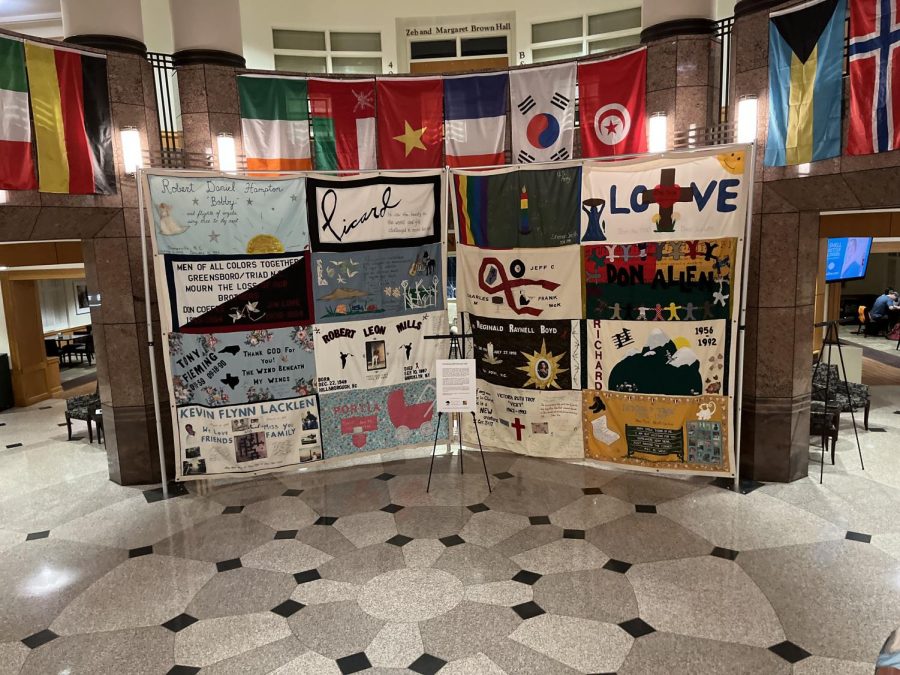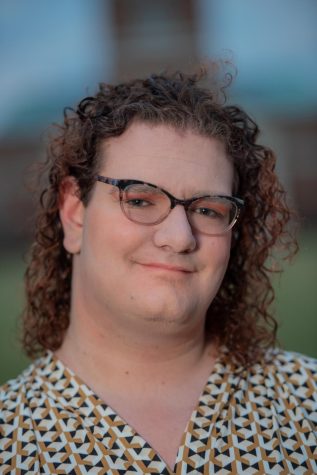Wake Forest hosts AIDS memorial quilt, will work to create new panels
Assistant Director of the LGBTQ+ Center Nayasia Coleman received a grant to create quilt-making workshops
A panel from the AIDS Memorial Quilt is displayed in Benson University Center.
January 23, 2023
Last week, Wake Forest University hosted the AIDS Memorial Quilt, a crucial and living piece of LGBTQ+ history in the United States. In the coming months, Wake Forest students and Forsyth and Guilford county residents will have the opportunity to add to that history.
The AIDS Memorial Quilt has been growing since its unveiling on Washington’s National Mall in 1987. Five of its more than 50,000 panels were on display in both Benson University Center (until Jan. 20) and Wait Chapel (until Jan. 17). The panels are 6 feet by 3 feet, roughly the same size as a grave.
Wake Forest students and community members in the Piedmont Triad will have the opportunity to create new panels for the quilt during multiple workshops throughout February, according to Nayasia Coleman, assistant director of the LGBTQ+ Center. On Wednesday, Coleman, who coordinated the effort to bring the quilt to Wake Forest, received a micro-grant to focus on adding more Black and brown voices to the quilt.
“That really inspired me because not only can we show the quilt, but we can also contribute and create a reciprocal energy between our campus and the National AIDS Memorial and the work that they’re doing,” Coleman said.
In addition to involving the Black and Latinx communities on campus in the quilt-making process, Coleman plans to host workshops at two historically Black colleges and universities (HBCUs) in the Triad: Winston-Salem State and North Carolina A&T. The pieces made at these workshops will be added to the National AIDS Memorial Quilt.
“I’m really trying to do some intentional outreach to make sure that we’re able to engage with the communities of color on campus so that they know [about the events],” Coleman said. “And so that we can have some initial conversations to get them to a place where they’re comfortable sharing something that for some is very personal.”
For Coleman, AIDS is something personal. They told the Old Gold & Black that two of their family members died due to complications from HIV and AIDS.
“Within my family, it’s been a whole thing to get people to a place where they would even admit that [those two family members died of AIDS],” Coleman said. “Those folks were just never spoken of again, and that’s been something that I’ve been working to reconcile in my own family. And so this work is pretty personal to me.”
They continued: “So I wanted to bring this quilt to the community so that other people could start having the conversations to get to a place where that’s something they’d be willing to share about their family members and to honor them in their truth.”
Now that Wake Forest has hosted the quilt, it will be easier for the university to host it again, according to Coleman. In the future, more Wake Forest students will have the opportunity to experience the emotional impact of the quilt.
“When we were putting up the quilt, there was just this energy that came with being able to sort of touch something that’s textile but tells a story,” Coleman said. “When we finally got the first quilt up in Benson, I just started to cry a little, seeing it in its full glory.”















